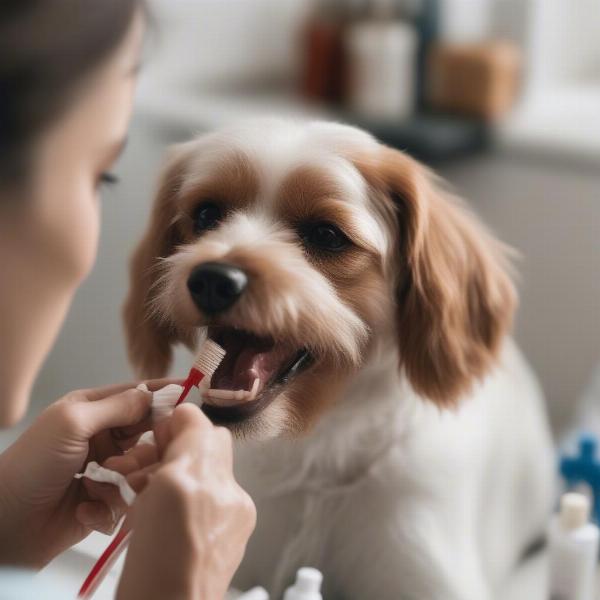Dental biscuits are a popular treat for dogs, often touted for their ability to improve dental hygiene. But do they really work? And how do you choose the best one for your furry friend? This comprehensive guide will explore everything you need to know about dental biscuits for dogs, from their effectiveness to potential risks and how to incorporate them into your dog’s dental care routine.
Understanding the Benefits of Dental Biscuits for Dogs
Dental biscuits are designed to mechanically scrape away plaque and tartar buildup on your dog’s teeth as they chew. This can help freshen breath and reduce the risk of gum disease. Some dental biscuits also contain ingredients like chlorophyll or parsley to further combat bad breath. However, it’s important to remember that dental biscuits are not a replacement for regular brushing and veterinary dental cleanings.
Choosing the Right Dental Biscuits
Not all dental biscuits are created equal. When selecting a dental biscuit for your dog, consider the following factors:
- Size and Shape: Choose a biscuit that is appropriately sized for your dog’s breed and chewing habits. Larger dogs require larger biscuits to prevent choking hazards. The shape should also promote effective chewing and cleaning action. Look for biscuits with ridges and grooves.
- Ingredients: Opt for biscuits made with high-quality, digestible ingredients. Avoid artificial colors, flavors, and preservatives. Look for options with added vitamins and minerals.
- Texture: The texture is crucial for effective plaque and tartar removal. A slightly abrasive texture is ideal for scraping away debris.
- Veterinary Approval: Look for the Veterinary Oral Health Council (VOHC) seal of acceptance. This indicates that the product has met specific standards for plaque and tartar control.
How to Incorporate Dental Biscuits into Your Dog’s Routine
Dental biscuits should be given as a treat, not as a meal replacement. Offer them in moderation to avoid weight gain. You can offer them after meals or as a reward during training sessions. Always supervise your dog when they are chewing on any treat.
Are There Any Risks Associated with Dental Biscuits?
While generally safe, some potential risks are associated with dental biscuits:
- Choking Hazard: Always choose an appropriately sized biscuit for your dog.
- Weight Gain: Dental biscuits contain calories. Overfeeding can lead to obesity.
- Allergic Reactions: Some dogs may be allergic to certain ingredients in dental biscuits. Monitor your dog for any signs of an allergic reaction, such as itching, vomiting, or diarrhea.
What Other Dental Care Options Are Available?
Dental biscuits are just one part of a comprehensive dental care routine for your dog. Other essential practices include:
- Brushing: Brushing your dog’s teeth daily with a dog-specific toothpaste is the most effective way to remove plaque and tartar.
- Professional Cleaning: Regular veterinary dental cleanings are essential for removing tartar buildup below the gum line.
Dr. Emily Carter, DVM, a leading veterinary dentist, recommends, “Dental biscuits can be a helpful addition to your dog’s oral hygiene routine, especially for dogs who resist toothbrushing. However, they should never replace regular brushing and professional cleanings.”
 Brushing a Dog's Teeth
Brushing a Dog's Teeth
Conclusion
Dental biscuits can be a valuable tool in maintaining your dog’s dental health. By choosing the right biscuit and incorporating it into a comprehensive dental care routine, you can help keep your dog’s teeth and gums healthy and their breath fresh. Remember to consult with your veterinarian for personalized advice on the best dental care practices for your dog.
FAQ
- How often should I give my dog dental biscuits? Dental biscuits should be given in moderation, typically one or two per day, depending on your dog’s size and the biscuit’s calorie content.
- Can puppies have dental biscuits? Yes, there are dental biscuits specifically designed for puppies. Choose a size and texture appropriate for their small mouths and developing teeth.
- What are the signs of dental problems in dogs? Bad breath, red or swollen gums, loose teeth, and difficulty chewing are all potential signs of dental problems.
- Are dental chews the same as dental biscuits? While similar, dental chews tend to be longer-lasting and offer more chewing satisfaction. Both can contribute to dental hygiene.
- Can I make my own dental biscuits for my dog? Yes, there are many recipes available online for homemade dog biscuits. However, ensure they use safe and healthy ingredients for dogs.
- My dog doesn’t seem interested in dental biscuits. What can I do? Try different flavors or textures. You can also try softening the biscuit with a bit of water or broth.
- Can dental biscuits replace brushing my dog’s teeth? No, dental biscuits are not a substitute for regular brushing and professional dental cleanings.
About ILM Dog
ILM Dog is your trusted resource for comprehensive dog care information, providing expert guidance on everything from breed selection and training to health, nutrition, and grooming. We offer a wealth of knowledge for both novice and experienced dog owners, equipping you with the tools to provide the best possible care for your canine companion. We specialize in helping you choose the right breed, maintain optimal health, understand dog behavior, and select appropriate products and accessories. Contact us for personalized support: [email protected] or +44 20-3965-8624. Visit ILM Dog for more information.